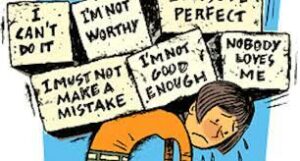Bipolar disorder is a mental illness that can cause extreme mood swings. These mood swings can range from happiness and excitement to depression and hopelessness. It is important to be able to detect the signs of bipolar disorder so that you can get treatment for yourself or a loved one. In this blog post, we will discuss the signs of bipolar disorder and how to get help.
Contents
What Is Bipolar Disorder?
 Bipolar disorder is a mental illness that causes people to experience extreme mood changes. These mood swings can be very debilitating and make it difficult for people to function in their everyday lives. In simple words, people with bipolar disorder experience highs and lows, which can last for weeks or even months at a time.
Bipolar disorder is a mental illness that causes people to experience extreme mood changes. These mood swings can be very debilitating and make it difficult for people to function in their everyday lives. In simple words, people with bipolar disorder experience highs and lows, which can last for weeks or even months at a time.
There are two main types of bipolar disorder: type I and type II. Type I is characterized by manic episodes that last for at least seven days, while type II is marked by shorter manic episodes followed by depressive episodes. People with type I bipolar disorder tend to experience more severe symptoms and have a higher risk of developing psychosis.
Moreover, it is important to note that bipolar disorder is a spectrum disorder, which means that there is a wide range of severity. Some people only experience mild symptoms, while others may be severely affected. And thus, you should not self-diagnose, but rather seek professional help if you think you may be suffering from bipolar disorder.
What Are The Signs Of Bipolar Disorder?
The signs of bipolar disorder can be divided into two categories: manic symptoms and depressive symptoms. People with bipolar disorder may experience both types of symptoms, or they may only experience one type. Let’s discuss each type of symptom in more detail and common signs of bipolar disorder.
Manic signs
- Feeling excessively happy or “high”
- Having lots of energy and feeling very productive
- Talking faster than usual and thinking very quickly
- Being easily distracted and having a hard time focusing on one task
- Sleeping less than usual but not feeling tired
- Engaging in risky behaviors, such as spending sprees, impulsive sex, and reckless driving
These manic signs or known as episodes can last for days or even weeks at a time. In one study it is found that the average length of a manic episode is three to six months. So, if you experience any of these symptoms, it’s important to seek professional help.
Depressive signs
Several signs may indicate someone is suffering from depression, which is one-half of bipolar disorder. Some of these include:
- Feeling sad, hopeless, or empty
- Loss of interest in activities that were once enjoyable
- Sleeping too much or having trouble sleeping
- Experiencing fatigue and decreased energy levels
- Having difficulty concentrating and making decisions
- Feeling worthless or guilty
- Thoughts of death or suicide
These are just some of the signs of bipolar disorder that may indicate someone is suffering from depressive episodes. Also, you should keep in mind that not everyone experiences all of these symptoms. Some people may only experience a few, while others may experience many.
Common signs of bipolar disorder
 Along with the manic and depressive episodes that are characteristic of bipolar disorder, other signs may be indicative of the condition. These can include:
Along with the manic and depressive episodes that are characteristic of bipolar disorder, other signs may be indicative of the condition. These can include:
- Excessive talking
- Decreased need for sleep
- Agitation or irritability
- Racing thoughts
- High-risk behaviors
- Impulsiveness
- Grandiose thinking
- Unrealistic plans
Overall these are just some general signs that may appear in someone suffering from bipolar disorder. If you or a loved one is exhibiting any of these behaviors, it’s important to seek professional help. A qualified mental health professional can give you a proper diagnosis and create a treatment plan that’s best for you.
How Does It Impact Life?
The signs of bipolar disorder can have a profound impact on every aspect of life. It can disrupt several aspects of life. Some of the common consequences include:
Problems with work or school
Bipolar disorder can make it very difficult to succeed in work or school. People with this condition may have a hard time concentrating, miss a lot of work or school, or get fired from their job. This happens because the symptoms of bipolar disorder can make it hard to function in everyday life. For example, if a student is having a manic episode, they may not be able to focus in class or do their homework.
Problems with relationships
Bipolar disorder can also make it hard to maintain healthy relationships. The symptoms of the condition can cause people to act impulsively, become irritable or angry, and say hurtful things. This can strain even the most supportive and understanding relationships. Because people are often unaware that they have bipolar disorder, loved ones may be left feeling confused, hurt, and frustrated.
Low self-esteem
 This is another consequence of bipolar disorder that people often experience. Low self-esteem can make you feel worthless and undeserving of good things in life. It can also make it difficult to maintain regular activities and hobbies. For example, if you enjoy painting, you may lose interest in it if you are feeling down about yourself.
This is another consequence of bipolar disorder that people often experience. Low self-esteem can make you feel worthless and undeserving of good things in life. It can also make it difficult to maintain regular activities and hobbies. For example, if you enjoy painting, you may lose interest in it if you are feeling down about yourself.
If you think you might have bipolar disorder, it’s important to seek professional help. Early diagnosis and treatment can make a big difference in managing the symptoms of the condition. With proper care, people with bipolar disorder can lead happy and productive lives.
How Can You Manage The Signs Of Bipolar Disorder?
There are several ways that you can manage the signs of bipolar disorder. These include:
Educate yourself about the condition
This is the first thing that you need to do. You need to educate yourself about the condition. This way, you will be able to understand what is happening to you and why. And this is always the important thing whenever you try to manage any condition. There are several resources available that can help you learn about bipolar disorder.
Identify and avoid your triggers
It is believed that in bipolar disorder, there is a chemical imbalance in the brain that can be triggered by certain environmental factors. These triggers can include stress, lack of sleep, seasonal changes, and even holidays. If you can identify your triggers, you can take steps to avoid them or at least be prepared for them.
Build a support network
A support network is a vital thing to managing bipolar disorder. This can include family, friends, therapy, and support groups. When you have people to rely on, you’ll feel less alone in your battle with bipolar disorder. It works both ways, too—being there for someone with bipolar disorder can give your life purpose and meaning. Also, this can be a great way to learn more about the condition.
Set goals
It’s important to set goals when you have bipolar disorder. This helps give you a sense of purpose and something to focus on. When you have goals, it’s easier to stick to your treatment plan and stay on track. Your goals should be realistic and specific. For example, if you’re having trouble with depression, a goal could be to get out of bed and take a shower each day. Or if you’re having trouble with mania, a goal could be to stick to a set sleep schedule.
Write down your goals and review them regularly. You should check with your doctor or therapist to make sure your goals are realistic and achievable.
Practice healthy coping mechanism
 Healthy coping mechanisms are key in managing bipolar disorder. Some helpful coping skills include:
Healthy coping mechanisms are key in managing bipolar disorder. Some helpful coping skills include:
- Stick to a routine: Having a set schedule can help stabilize mood swings.
- Exercise: Getting regular exercise can help improve your energy and mood.
- Eat a balanced diet: Eating healthy foods can help stabilize your mood.
- Get enough sleep: Getting enough rest can help improve your energy and mood.
- Avoid drugs and alcohol: Substances can worsen symptoms of bipolar disorder.
This might seem like a lot to manage, but there are treatments available that can help. Following these healthy coping will help you live a fulfilling life while managing bipolar disorder.
Seek therapy
Therapy is one of the most important aspects of treating bipolar disorder. It can help you understand your triggers, develop coping mechanisms, and identify early warning signs of a relapse. Several types of therapy can be effective in treating the signs of bipolar disorder, these include:
- Cognitive behavioral therapy
- Interpersonal and social rhythm therapy
- Psychodynamic therapy
These therapies are considered to be the most effective in treating bipolar disorder, however, it is important to work with a therapist that you trust and feel comfortable with.
Bipolar disorder can be a difficult mental illness to live with, but there are treatments available that can help. If you or someone you know is showing signs of bipolar disorder, don’t hesitate to reach out for help. Early intervention is key to managing the condition. They can perform a psychological evaluation and help you get the treatment you need.
Conclusion
Conclusively, signs of bipolar disorder are generally easy to detect if you know what to look out for. However, because the symptoms can vary so much from person to person, it’s important to get a professional evaluation if you suspect that you or someone you love may be suffering from this mental illness. If bipolar disorder is diagnosed, there are many effective treatments available that can help people manage their symptoms and live full, productive lives.
If you or someone you know is exhibiting signs of bipolar disorder, don’t hesitate to reach out for help. The sooner treatment is started, the better the chances are for a successful outcome.
For more information and tips you can contact Therapy Mantra. We have a team of professional therapists who can provide you with the support and guidance you need to recover from this condition. Contact us today to learn more about our services. You can also book an online counseling and therapy session or download our free Android or iOS app.


